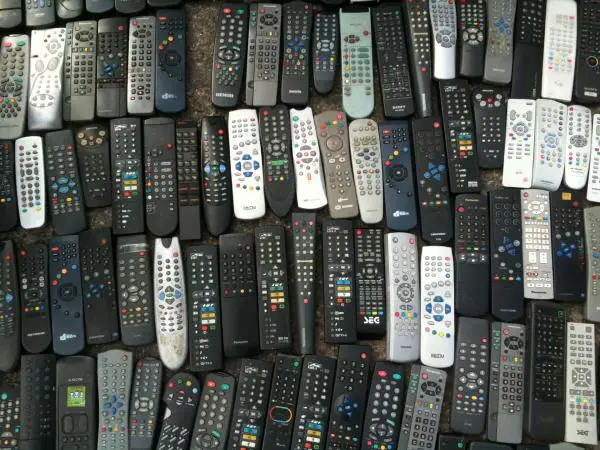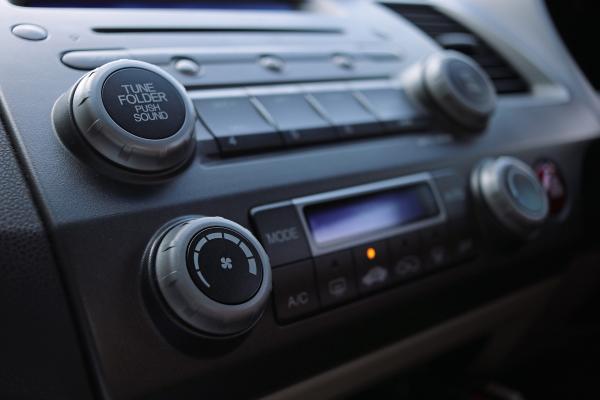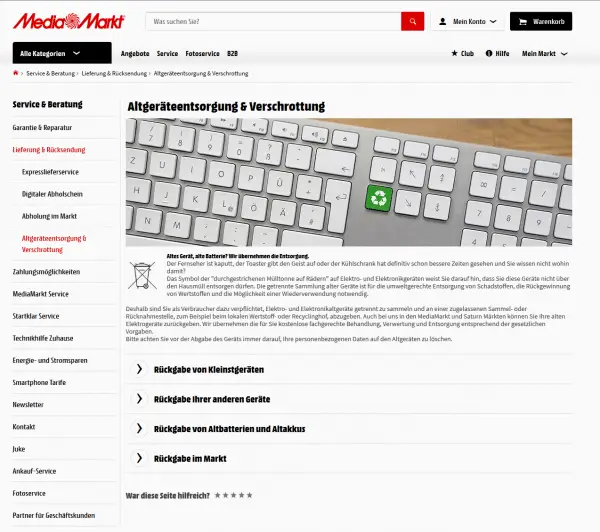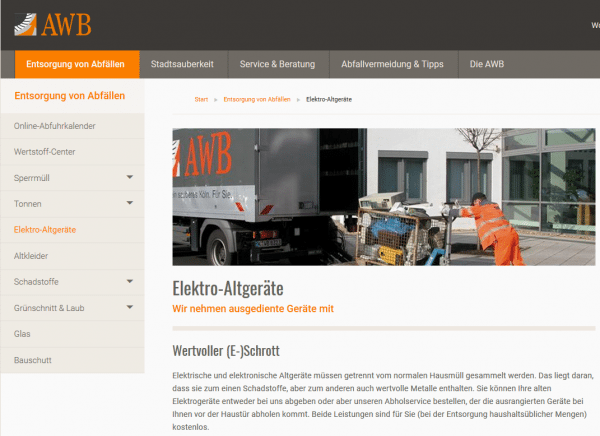Since August 2018, new regulations have been in effect for the disposal of electronic waste, which are important for every consumer. Read here what exactly has to be disposed of separately and where you can do this.
What does electronic waste belong to?
The electrical and electronic equipment law (ElektroG) regulates what belongs to electronic scrap and this was expanded in August 2018. Obviously, this includes electronic devices like televisions, refrigerators, smartphones, computer mice, e-bikes, electric toothbrushes and so on. In the meantime, however, it also includes all other devices that consume electricity in some way, be it via a cable or via rechargeable batteries. Do you have a Christmas sweater with glowing reindeer? Electronic waste! A bike backpack with indicators? Also falls under the ElektroG.
 Classic e-waste: the spoils of a lifetime with remote controls.
Classic e-waste: the spoils of a lifetime with remote controls. The last two examples are products with permanently installed electronics that cannot be removed or can only be removed with great difficulty. The situation is different, for example, in a cabinet with a built-in reading light. This can usually be easily removed and is then generated solely as electronic waste. Basically, you can really approach the whole thing with common sense: Anything that consumes electricity and cannot be separated from things that do not consume electricity must be disposed of in accordance with ElektroG. But there is no rule without exceptions..
What does not belong to electronic waste?
Incandescent and halogen lamps can still be disposed of with household waste, batteries and rechargeable batteries must still be returned to collection points. It becomes interesting, for example, with toner cartridges and printer cartridges: Variants with electrical components must be disposed of separately, all others can alternatively be disposed of with the residual waste.
It looks a little absurd with other categories: hot water devices and air conditioning systems are rated as permanent installations and do not fall under the ElektroG - but you should dispose of your mobile air conditioning system or your old boiler properly! Quite curious: car radios are also considered to be permanently installed and, strictly speaking, must be disposed of in consultation with the municipality or the local waste disposal company. As a rule, however, you can dispose of these in the same way as other radios..
 Special case car radio: Disposal after clarification with waste disposal company.
Special case car radio: Disposal after clarification with waste disposal company. Which dealers have to take back?
Here, too, it is becoming very German again: Dealers who have a sales area for electrical and electronic equipment of at least 400 square meters are obliged to take back products. For online retailers, the same applies to the storage area. Of course, that's not always easy to determine, to put it mildly, but at least you can assume that all major players in the industry are obliged to take back certain products to a certain extent.
There is also a separate return policy for online retail: returns to stationary retailers can be made directly on site, the online retailer must designate a collection point "within a reasonable distance" - so far, so good. In the case of large devices supplied, stationary dealers must take away any old devices of the same category free of charge; For example, the old television when a new device is delivered. In this case, however, online retailers can again fall back on the collection station at a "reasonable distance" and thus pass the costs on to the customer. The dealers can then offer a take-away service for a fee. Either way, you should clarify the return policy before buying.
What do dealers have to take back?
In the case of large electrical appliances, retailers have to take back the corresponding counterparts, as I said, i.e. refrigerator versus refrigerator, washing machine versus washing machine and so on.
It looks a lot easier with small devices. You can return these to any of the retailers defined above, provided that each edge length is less than 25 centimeters. The law explicitly states that this must not be tied to the purchase of new equipment. However, the return is limited to five old devices per device type.
 All major electronics stores offer information on all aspects of taking back.
All major electronics stores offer information on all aspects of taking back. Where do you get rid of the junk?
According to the consumer advice center, only around 42 percent of electronic waste is properly disposed of, the law aims at 65 percent by 2019. And to be honest: Often times, the way through the dealer is rather cumbersome. The easiest way to dispose of it is still the public waste disposal company, i.e. the local waste disposal company.
They are obliged to accept electronic waste free of charge - even in larger quantities. However, if you want to deliver more than 20 devices from one of the device groups heat exchangers, large devices or photovoltaic modules, you must clarify the point in time with the disposal company in advance. In other words: As a rule, private individuals can simply bring all of their e-waste to the nearest recycling center, or whatever your local waste disposal company calls them, and hand them in there.
However, it is worthwhile to take a look at the homepages of such establishments in advance, as there are in some cases their own regulations. For example, you may limit the acceptance to certain groups and quantities of devices if this is necessary for reasons of space. For example, Abfallwirtschaftsbetriebe Köln GmbH only accepts two large electrical appliances or a corresponding number of small appliances at a time.
Most disposal companies should also offer a pick-up service, basically the good old bulky waste - only in the electric version. Here, too, you have to find out more in advance and, in some cases, even specify in advance which devices are to be disposed of. If you simply mix e-waste with normal bulky waste, it is usually left standing.
 Check the website of your local waste disposal company to see what you can dispose of, how and where.
Check the website of your local waste disposal company to see what you can dispose of, how and where. Sell and give away
For the sake of environmental protection, another option should be mentioned: "Scrap" often simply means out of date, not necessarily broken. In such cases you should see whether it is better to give usable devices away as gifts. In the city, a halfway clean toaster with a "still working" note is guaranteed not to stand on the sidewalk for two hours. And social department stores are also happy about everything that is still for sale.
In general, the environment is happy about every year that an electrical device is used longer.
The sale of real scrap to scrap dealers, on the other hand, is often criticized because it is really only about the pure material value of metals. And it is well known that electronic waste often ends up in African landfills, where it is broken down into its individual parts under poor conditions and often by children. If in doubt, you should do without these three euros and still go to the designated disposal points.